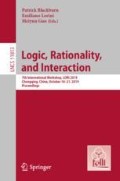Abstract
There are currently two approaches to the logic of knowing how: the planning-based one and the coalition-based one. However, the first is single-agent, and the second is based on single-step joint actions. In this paper, to overcome both limitations, we propose a multi-agent framework for the logic of knowing how, based on multi-step dynamic epistemic planning studied in the literature. We obtain a sound and complete axiomatization and show that the logic is decidable, although the corresponding multi-agent epistemic planning problem is undecidable.
Access this chapter
Tax calculation will be finalised at checkout
Purchases are for personal use only
Notes
- 1.
It is not the case in the closely related epistemic ATL e.g., [7].
- 2.
One may find \(\mathtt {AxKtoKh}\) counter-intuitive under the global view of know-how (cf. [18]): knowing that the safe is open does not imply knowing how to open it in all the possible situations. However, the notion of know-how in this paper is a local one: knowing how to achieve \(\varphi \) under the current circumstance.
References
Andersen, M.B., Bolander, T., Jensen, M.H.: Conditional epistemic planning. In: del Cerro, L.F., Herzig, A., Mengin, J. (eds.) JELIA 2012. LNCS (LNAI), vol. 7519, pp. 94–106. Springer, Heidelberg (2012). https://doi.org/10.1007/978-3-642-33353-8_8
Aucher, G., Bolander, T.: Undecidability in epistemic planning. In: Proceedings of IJCAI 2013, pp. 27–33 (2013)
Bolander, T.: A gentle introduction to epistemic planning: the DEL approach. Electron. Proc. Theor. Comput. Sci. 243, 1–22 (2017)
Bolander, T., Andersen, M.B.: Epistemic planning for single and multi-agent systems. J. Appl. Non-Classical Logics 21(1), 9–34 (2011)
Fan, J., Wang, Y., Van Ditmarsch, H.: Contingency and knowing whether. Rev. Symbolic Logic 8(1), 75–107 (2015)
Fervari, R., Herzig, A., Li, Y., Wang, Y.: Strategically knowing how. In: IJCAI International Joint Conference on Artificial Intelligence, pp. 1031–1038 (2017)
Jamroga, W., Ågotnes, T.: Constructive knowledge: what agents can achieve under imperfect information. J. Appl. Non-Classical Logics 17(4), 423–475 (2007)
Li, Y., Wang, Y.: Achieving while maintaining: a logic of knowing how with intermediate constraints. In: Ghosh, S., Prasad, S. (eds.) ICLA 2017. LNCS, vol. 10119, pp. 154–167. Springer, Heidelberg (2017). https://doi.org/10.1007/978-3-662-54069-5_12
Moore, R.C.: A formal theory of knowledge and action. Technical report, DTIC Document (1984)
Naumov, P., Tao, J.: Second-order know-how strategies. In: 2018 AAMAS (2018)
Naumov, P., Tao, J.: Strategic coalitions with perfect recall. In: 2018 AAAI (2018)
Naumov, P., Tao, J.: Together we know how to achieve: an epistemic logic of know-how. Artif. Intell. 262(9), 279–300 (2018)
Naumov, P., Tao, J.: Knowing-how under uncertainty. Artif. Intell. 276, 41–56 (2019)
Stanley, J.: Know How. Oxford University Press, Oxford (2011)
van Benthem, J., Gerbrandy, J., Hoshi, T., Pacuit, E.: Merging frameworks for interaction. J. Philos. Logic 38(5), 491–526 (2009)
Wang, Y.: A Logic of knowing how. In: Proceedings of LORI-V, pp. 392–405 (2015)
Wang, Y.: A logic of goal-directed knowing how. In: Synthese, pp. 1–21 (2016)
Wang, Y.: Beyond knowing that: a new generation of epistemic logics. In: van Ditmarsch, H., Sandu, G. (eds.) Jaakko Hintikka on Knowledge and Game-Theoretical Semantics. OCL, vol. 12, pp. 499–533. Springer, Cham (2018). https://doi.org/10.1007/978-3-319-62864-6_21
Wang, Y., Aucher, G.: An alternative axiomatization of DEL and its applications. In: IJCAI, pp. 1147–1154 (2013)
Wang, Y., Cao, Q.: On axiomatizations of public announcement logic. Synthese 190(1S), 103–134 (2013)
Wang, Y., Fan, J.: Conditionally knowing what. In: Proceedings of AiML, vol. 10, pp. 569–587 (2014)
Xu, C., Wang, Y., Studer, T.: A logic of knowing why. Synthese (2019)
Yu, Q., Wen, X., Liu, Y.: Multi-agent epistemic explanatory diagnosis via reasoning about actions. In: Proceedings of IJCAI 2013, pp. 1183–1190 (2013)
Acknowledgement
Yanjun Li would like to thank the support from NSSF grant 18CZX062. The authors thank the anonymous reviewers for their detailed comments that improved the presentation of the paper.
Author information
Authors and Affiliations
Corresponding author
Editor information
Editors and Affiliations
Rights and permissions
Copyright information
© 2019 Springer-Verlag GmbH Germany, part of Springer Nature
About this paper
Cite this paper
Li, Y., Wang, Y. (2019). Multi-agent Knowing How via Multi-step Plans: A Dynamic Epistemic Planning Based Approach. In: Blackburn, P., Lorini, E., Guo, M. (eds) Logic, Rationality, and Interaction. LORI 2019. Lecture Notes in Computer Science(), vol 11813. Springer, Berlin, Heidelberg. https://doi.org/10.1007/978-3-662-60292-8_10
Download citation
DOI: https://doi.org/10.1007/978-3-662-60292-8_10
Published:
Publisher Name: Springer, Berlin, Heidelberg
Print ISBN: 978-3-662-60291-1
Online ISBN: 978-3-662-60292-8
eBook Packages: Computer ScienceComputer Science (R0)

